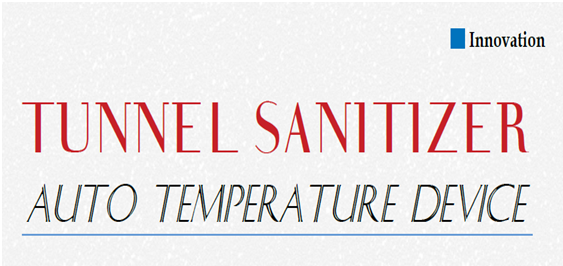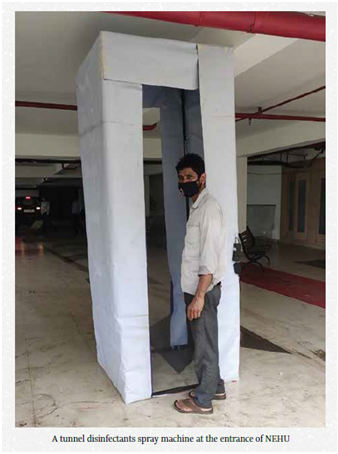 In the wake of the coronavirus outbreak disinfectant tunnels are emerging as India's one of the important strategy to disinfect people and protect against infections. The tunnel is designed with a view to reduce the time of sanitization in places where there are people entering in large numbers such as religious gatherings, educational institutions, hospitals etc. The sanitization process is effective as the person walks through the tunnel and disinfectants are sprayed all over the person from different angles so that the whole body can be sanitized. Taking into consideration the above research, a collaborative team comprising of faculty, scientists, doctors and industrialist have developed a tunnel sanitizer based automatic temperature controller device.
In the wake of the coronavirus outbreak disinfectant tunnels are emerging as India's one of the important strategy to disinfect people and protect against infections. The tunnel is designed with a view to reduce the time of sanitization in places where there are people entering in large numbers such as religious gatherings, educational institutions, hospitals etc. The sanitization process is effective as the person walks through the tunnel and disinfectants are sprayed all over the person from different angles so that the whole body can be sanitized. Taking into consideration the above research, a collaborative team comprising of faculty, scientists, doctors and industrialist have developed a tunnel sanitizer based automatic temperature controller device.
The team comprises of people from multidisciplinary areas: Mr.Hirak Ranjan  Das, Mr. Noor Islam and Mr.Sasanka Barooah from the Royal Global University, Guwahati, Dr. Dinesh Bhatia from the North Eastern Hill University, Shillong, Dr.Kalyan Kumar Das, Assam Engineering Collegeand Prof. Animesh Mishra from NEIGHRIMS, Shillong. After more than three months of research, discussions, trials and testing, the machine has been made compact and cost effective. The people passing are sprayed with a disinfectant solution coming out of a high pressure air compressor. The disinfectant is eco-friendly, multi-purpose microbiocide solution which is effective to disinfect different bacterial spores, viruses, protozoa, fungi etc. When a person enters through the tunnel automatically the nozzle will be activated and a full body alongwith the cloth/shoes etc. will be sanitized with sprays at high pressure and speed. The disinfecting process can be completed in 3-4 seconds. With proper implementation such as sanitizers, it can disinfect articles of clothing and shoes for a significant period of time. The output material is like mist and highly effective as it covers a larger surface area unlike liquid disinfectant and does not need any drainage system in place. The tunnel does not require human control and operates with the help of ultrasonic sensors and microcontrollers. It has two chambers with three different levels of disinfection. In the second chamber, the person entering the tunnel experiences a hot air blast at 70˚ Centigrade. This is to make sure that any bacteria/viruses that could have survived during the disinfectant spray process would be killed through the heat in the second chamber. It is followed by exposure of far UVC light with a wavelength ranging from 207 to 222 nm that has capability to kill the viruses and is considered to be safe for the human eyes and skin.
Das, Mr. Noor Islam and Mr.Sasanka Barooah from the Royal Global University, Guwahati, Dr. Dinesh Bhatia from the North Eastern Hill University, Shillong, Dr.Kalyan Kumar Das, Assam Engineering Collegeand Prof. Animesh Mishra from NEIGHRIMS, Shillong. After more than three months of research, discussions, trials and testing, the machine has been made compact and cost effective. The people passing are sprayed with a disinfectant solution coming out of a high pressure air compressor. The disinfectant is eco-friendly, multi-purpose microbiocide solution which is effective to disinfect different bacterial spores, viruses, protozoa, fungi etc. When a person enters through the tunnel automatically the nozzle will be activated and a full body alongwith the cloth/shoes etc. will be sanitized with sprays at high pressure and speed. The disinfecting process can be completed in 3-4 seconds. With proper implementation such as sanitizers, it can disinfect articles of clothing and shoes for a significant period of time. The output material is like mist and highly effective as it covers a larger surface area unlike liquid disinfectant and does not need any drainage system in place. The tunnel does not require human control and operates with the help of ultrasonic sensors and microcontrollers. It has two chambers with three different levels of disinfection. In the second chamber, the person entering the tunnel experiences a hot air blast at 70˚ Centigrade. This is to make sure that any bacteria/viruses that could have survived during the disinfectant spray process would be killed through the heat in the second chamber. It is followed by exposure of far UVC light with a wavelength ranging from 207 to 222 nm that has capability to kill the viruses and is considered to be safe for the human eyes and skin.
To read the further articles please get your copy of Eastern Panorama July issue @http://www.magzter.com/IN/Hill-Publications/Eastern-Panorama/News/ or mail to contact @easternpanorama.in


